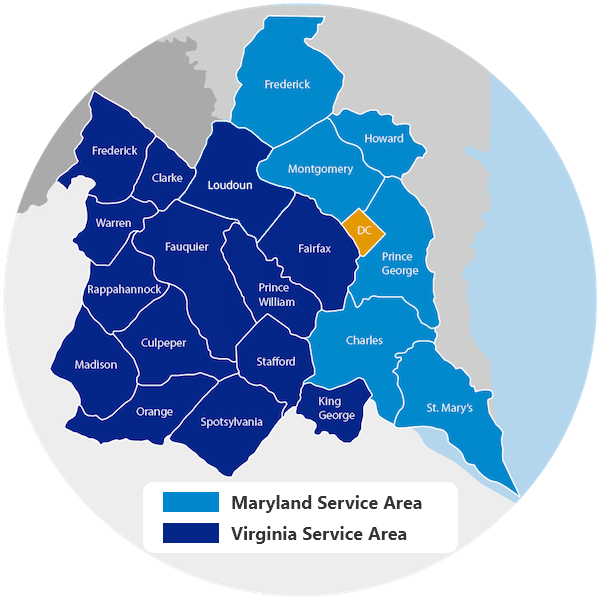The Washington, DC metropolitan area is known for severe summer storms. Heavy rains, strong winds, lightning and hail associated with severe thunderstorms, hurricanes, tornadoes and derechos interfere with outdoor plans, cause damage to homes and yards â and may place your family in danger.
This is the second of three blog posts on preparing for powerful storms. Here's what you need to know to keep your family safe and protect your home during a powerful summer storm.
Shelter in place. Identify the safest area of your home, where you can take shelter when a powerful storm hits. In most homes, this will be the basement or a small interior room without windows, like a bathroom. Close interior doors, exterior doors and windows. Stay away from windows and doors and put as many walls between you and the storm as possible.
Lightning. If there's lightning, stay inside your vehicle or home. Don't take showers, baths or wash dishes. If your house is struck, lightning can travel through plumbing pipes and cause electrical shock. Also avoid using landline phones, TVs or other appliances that conduct electricity.
Hail. In severe storms, a hailstone can be as big as a softball and fall at 50-100 miles per hour. Stay inside away from skylights, windows and glass doors. If you can, park your car in the garage or carport.
Flash floods. Flash floods develop quickly. If a flash flood warning is issued for your area, don't wait until you see rising water â get out of low areas subject to flooding. If you're stuck at home, climb to safety immediately. If you're out, don't drive or walk through flooded roadways. Remember to turn around, don't drown.
Power outages. Power outages are common during powerful summer storms. Restoring power safely takes time, so follow these steps to minimize the effect of an outage:
â Only use a flashlight or portable lantern for lighting. Don't use candles, due to the extreme risk of fire.
â Report outages to your local power company.
â Locate your emergency storm kit.
â Unplug or turn off TVs, computers, appliances and lights (keep one lamp switched on so you know when power has been restored).
â Keep refrigerator and freezer doors shut.
â Drink plenty of water and avoid overheating.
â Close blinds and shades to keep rooms cool.
â When conditions are safe, check on elderly or home-bound neighbors.
Backup generators. A backup generator can ensure safety and comfort for you and your family if there's a power outage. Hire a professional to install it. If you have a portable generator, don't run it inside your home or garage. Connect the equipment you want to power directly to the outlets on the generator. Don't connect the generator to your home's electrical system.
In the DC area summer storms are inevitable, so be prepared. You can keep yourself and those around you safe during a storm by sheltering in place, taking flash flood warnings seriously and managing power outages with the help of an emergency supply kit and a backup generator.
To find out how NV Waterproofing can help you prepare your home and yard for powerful summer storms â and help prevent wet basements and other water damage â visit nvwaterproofing.com or call 1-571-339-5331.
Disclaimer of Liability
The information in this blog is provided for general guidance only and does not constitute the provision of legal, engineering, architectural, professional or healthcare advice. The information provided herein should not be used as a substitute for consultation with professional advisers. Before making any decision or taking any action, you should consult a professional adviser who has been provided with all pertinent facts relevant to your particular situation. The information is provided âas is,â with no assurance or guarantee of completeness, accuracy or timeliness of the information, and without warranty of any kind, express or implied, including but not limited to warranties of performance, merchantability and fitness for a particular purpose.



